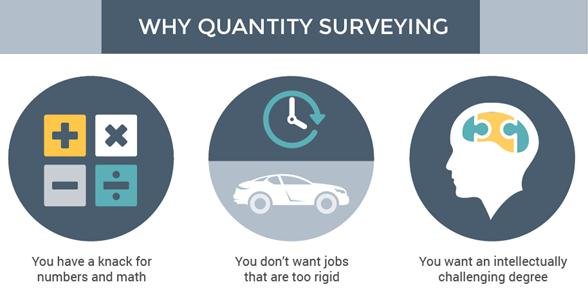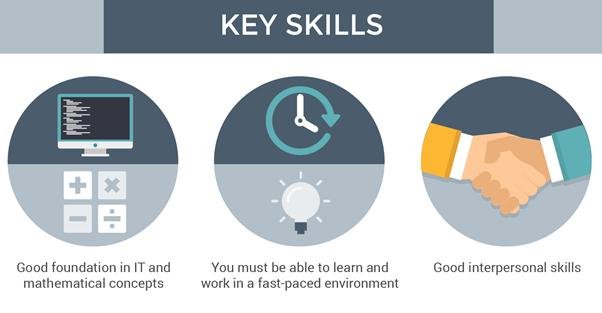

Ever tried building a sandcastle on the beach?
To create a solid sandcastle structure, you’ll need a generous amount of sand and just the right amount of water. Not too little, not too much. Otherwise, your wondrous creation will disintegrate and fall apart.
This concept is pretty much the same for buildings too, from the towering Burj Khalifa and Petronas Twin Towers to your everyday apartment and terrace house.
Someone needs to be responsible for determining how much “sand and water” is required to build them, and most importantly, how much it will cost. After all, buildings don’t come cheap.
That’s where Quantity Surveyors come in.
#1. The Basics of Quantity Surveying
a) What is Quantity Surveying?

Quantity Surveying deals with estimating and managing construction costs to ensure value for money, while meeting the required building standards and quality at the same time.
It plays a pivotal role in every property development project, as each material (bricks, concrete, steel frames, etc.), resource (engineers, contractors, labourers, Etc.) and equipment (concrete mixers, piling rigs, tractors, etc.) needs to be accounted for.
A construction project has many moving parts, and costs can easily balloon out of control. Quantity surveyors work out the estimated cost at the start of the project, and continue to keep watch on the costs and monitor cost variations as the project progresses.
#2. Studying a Quantity Surveying Course
a) Entry Requirements & Qualifications
In order to pursue a Quantity Surveying course, you will need a diploma or degree in Civil Engineering.
b) What Will You Study in a Quantity Surveying Course?
A course in Quantity Surveying will provide you with the necessary foundation in the economics, laws, technology and management concepts relevant to the construction industry.
You will be taught technical and management skills to enable you to adapt to various project conditions and to solve problems creatively.
Generally, here are some of the topics that you shall take in a Quantity Surveying course:
- Building Materials Estimate
- Cost Planning
- Construction Technology
- Building Services
- Estimating
- Project Management
- Financial Management
- Value Management

#3. Why Should You Study Quantity Surveying?
Now that you know a little more about Quantity Surveying, are you still unsure whether you should take it up? Here’s why you should!
(a) You have a knack for numbers and math
If you’re fond of numbers, but you’re not too keen on mainstream courses like Accounting, Actuarial Science or Engineering, you may want to give Quantity Surveying a thought, as it’s a course that requires a lot of numerical prowess.
From running cost analyses to making structured estimations, your mastery of mathematical concepts will be a huge advantage for you.
(b) You don’t want jobs that are too rigid
Quantity Surveying is a field that will allow you to break free from the confines of the four office walls. You will get lots of opportunities to visit construction sites and meet different people, from architects and lawyers to engineers and businessmen. You may also get to travel if your employer runs outstation construction projects.
If you like your work schedules to be different every day, then Quantity Surveying is a course that you can consider.
(c) You want an intellectually challenging technical skill apart from engineering diploma/ degree.
You will be exposed to a wide range of subjects from various fields, including management, economics, law and finance, on top of building and construction technologies.
You need to be able to think creatively for solutions, but at the same time, you are also bound by the limitations of the various law and finance principles. Strong commitment and discipline in studies are definitely needed in order to perform well in a Quantity Surveying course.
#4. What Skills Do You Need to Study Quantity Surveying?

Here are some key qualities and skills that you will need to develop in order to do well in a Quantity Surveying course.
(a) Good foundation in IT and mathematical concepts
While Quantity Surveying is highly related to cost management in construction projects, it is also an IT-intensive field, relying on various mathematical software and programmes. After all, construction is a complex business, requiring lots of planning, organising and scheduling.
Having a strong grasp of fundamental IT skills and mathematical knowledge will be beneficial for you in a Quantity Surveying course.
(b) Ability to learn and work in a fast-paced environment
As part of this course, you will learn a broad range of subjects, from construction and building technology to business and law principles. Learning fast and efficiently is crucial in order to be able to juggle with such diverse subjects.
Picking up this skill will be important for your career as well. As a quantity surveyor, you can expect to handle several projects from multiple clients, all with their own respective requirements and timelines. You may also find yourself having to pick up detailed knowledge of current and past building technology, processes and legal matters.
(c) Good interpersonal skills
Quantity surveying is not a “lone person industry”. You will need to work with a diverse range of people as part of the construction industry, from architects and contractors to clients and engineers.
To prepare you for this inevitability, group assignments and projects are almost unavoidable in Quantity Surveying courses. It’s important to have good communication and interpersonal skills and that you work well with your course mates. This includes understanding what others are saying, asking appropriate questions and conveying complex information effectively.
#5. What Career Options Do You Have with a Quantity Surveying Course?
Once you’ve completed your Quantity Surveying degree, you can generally seek employment with construction companies, engineering consultancy firms, property developers or even local government authorities and agencies.
Generally, here are some of the career options that you can choose to pursue upon completion of a Quantity Surveying course.
- Building Surveyor
- Building Material Manager
- Construction Executive
- Contract Executive
- Cost Manager
- Project Coordinator
- Quantity Surveyor
Day wise schedule of Quantity Surveying
COURSE OVERVIEW
Day 1:
- What is QS?
- Methods of estimates
- Main items of work calculations
Day 2:
- Different types of footings
- Different types of columns
- Different types of beams
Day 3:
- Different types of floors
- Different types of slabs
- Different types of load names
Day 4:
- Different types of wall
- Unit conversions and representations
Examples of conversions
Day 5:
- Standards of materials based on weight and density
- Standards for the cement mortar for brick work
- Standards for the cement mortar for plastering work
- Standards for the concrete works
Day 6:
- Rate conversions
- Rate conversions for area and volume
- Different formulas for different shapes
- Assignments
Day 7:
- List of the topics to be calculated
- How to do shuttering area calculations (SAC) for different shapes of columns
- How to do the volume calculations (VC) for different shapes of columns
- How to calculate the SAC and VC for normal footing along with water proofing calculations (WPC)
- How to calculate the SAC and VC for combines footing along with WPC
- Assignments
Day 8:
- How to calculate the SAC and VC for raft footing along with WPC
- How to calculate the SAC and VC for step footing along with WPC
- Assignments
Day 9:
- How to calculate the SAC and VC for pile footing along with WPC
- How to calculate the SAC and VC for isolated footing along with WPC
- How to calculate the SAC and VC for combined isolated footing along with WPC
- Assignments
Day 10:
- How to calculate the SAC and VC for rectangular column along with WPC
- How to calculate the SAC and VC for circular column along with WPC
- How to calculate the SAC and VC for l type of column along with WPC
- How to calculate the SAC and VC for t type of column along with WPC
- Assignments
Day 11:
- How to calculate the SAC and VC for beams and slabs along with WPC
- Assignments
Day 12:
- How to calculate the SAC and VC for beams and slabs along with WPC
- Assignments
- Revision of old syllabus doubts and clarifications
Day 13:
- How to calculate the SAC and VC for dome slabs along with WPC
- Assignments
Day 14:
- How to calculate the SAC and VC for semi round staircase along with WPC
- How to calculate the SAC and VC for dog legged staircase along with WPC
Assignments
Day 15:
- Brick work calculations along with cement and sand calculations for mortar
- Assignments
Day 16:
- Plastering calculations along with cement and sand calculations for mortar
- Assignments
Day 17:
- Flooring calculations
- Wall putty calculation
- Painting calculations
- Assignments
Day 18:
- Basic for bar bending schedule (BBS)
Day 19:
- Different methods of calculating weight of steel
- Multiple types of steel calculations
Day 20:
- Plain type of mesh calculations for length, no of bars & weight calculations
Assignments
Day 21:
- Mesh in which bar bend till the depth of footing calculations for length, no of bars & weight calculations
- Assignments
Day 22:
- Mesh with hooks calculations for length, no of bars & weight calculations
- Assignments
Day 23:
- Double mesh with chairs & rings calculations for length, no of bars & weight calculations
- Assignments
Day 24:
- Beam calculation for length, no of bars & weight calculations
- Assignments
Day 25:
- Column calculation for length, no of bars & weight calculations
- Assignments
Day 26:
- Slab type 1 calculation for length, no of bars & weight calculations
- Assignments
Day 27:
- Slab type 2 calculation for length, no of bars & weight calculations
- Assignments
Day 28:
- Revision class or doubt class
Day 29:
- Estimation
Day 30:
- Costing calculation and how to make summary of the project
Training from Expert:
Mohammed Sadiq (Director, ECC)
21 years Exp on E&C and QS.
Gulf Returned Trainer
COURSE FEES & TRAINING METHODOLOGY
Training Methodology-1: (At ECC Premises)
Note: ECC is closed because of the Pandemic in March 2020 and will remain closed till the Pandemic completely ends. So, the students are advised to prefer online training only.
a) The student is supposed to listen the day’s prescribed syllabus through our e-learning video lectures.
b) Then he is supposed to practice the same in the computer lab, with the help of e-tutors.
c) The lectures are made in such a way that the student will be able to do without any staff help.
d) Still, if the students gets any doubt, then the staff will assist him.
Course Fees: Rs.10000/-
Training Methodology-2: (Completely online)
a) The student is supposed to listen the day’s prescribed syllabus through our e-learning video lectures.
b) Then he is supposed to practice the same in the computer lab, with the help of e-tutors.
c) Software installation help will be given by our Systems support Engineer.
d) The lectures are made in such a way that the student will be able to do without any staff help.
e) Still, if the students gets any doubt, they are required to make a note of the same and email us in the doubts section in our online portal www.eccindia.org
f) Our instructors will answer your queries within 24 hours (or) will come online through skype and shall answer all the queries from all the students.
Course Fees: Rs.8000/-
CONTACT INFORMATION
Contact Ms. Naima on 98661-31068 between 11am-6pm for any queries (or) Email us at services@eccindia.org and mark a copy to training@eccindia.org
For any Queries on online training, please contact Ms. Reshma between 9am-6pm on 97033-31068.

Trainer:
Md. Sadiq
B.Tech (Civil), MBA
Director
ENGINEERS CADD CENTRE PVT LTD
Brief Profile: Has over 21 years of Experience in Civil Engineering Projects in India and middle east. One of the best Trainers for Primavera, Quantity Surveying & 3DS Max Training in Hyderabad. He has trained over 400 Batches on Primavera, QS & 3DS Max put together to students and also to leading consulting engineers and project managers.
